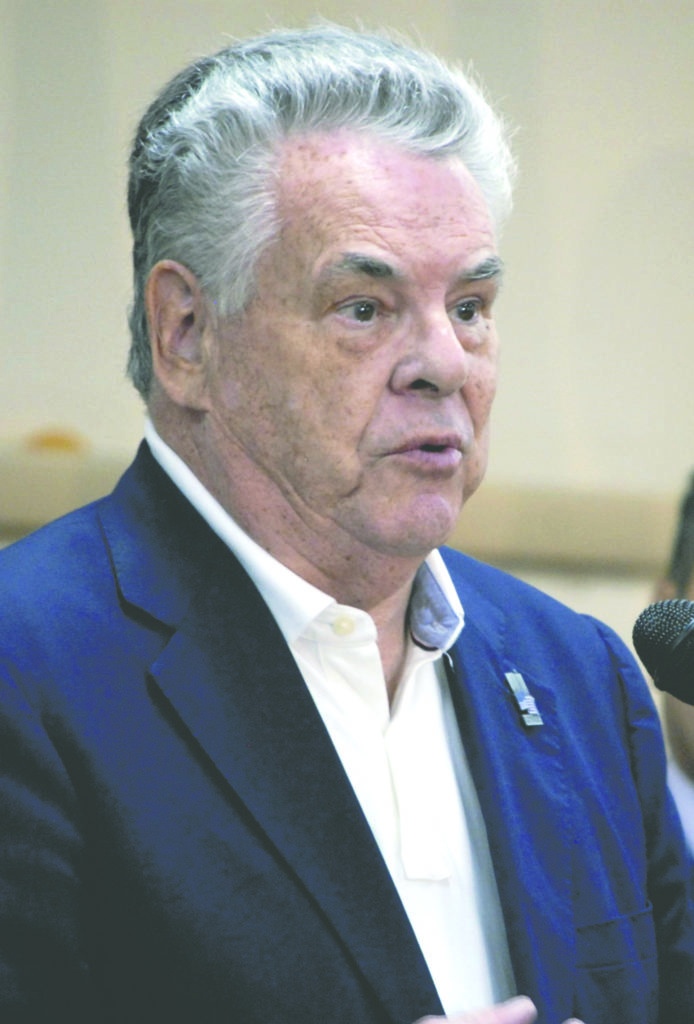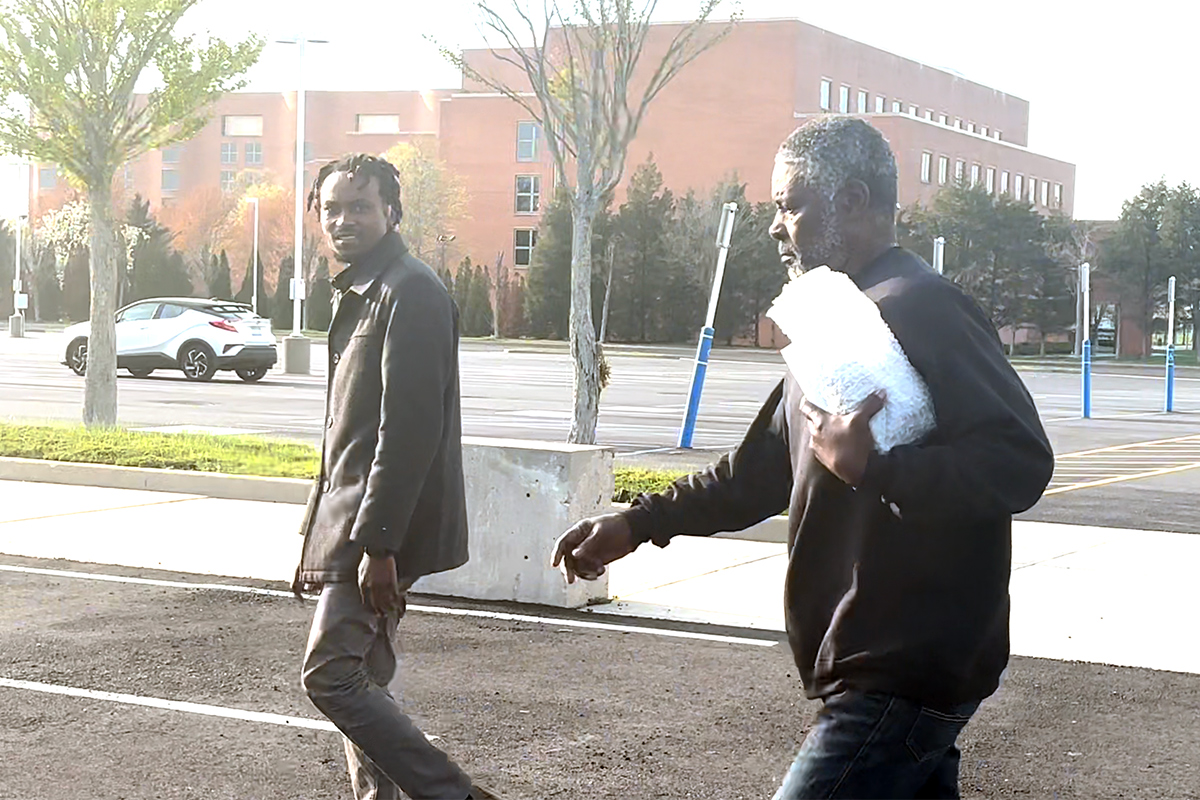
(Photo by Frank Rizzo)
Few can do “retail politics” quite like Peter King, the longtime Republican congressman.
On his Facebook page you’d see, pre-pandemic, pictures of the pol at local diners enjoying meals and conversations with retired cops or firefighters or other groups.
One recent morning, standing in front of his district office in Massapequa Park, King was getting ready to do some campaigning. But not for himself. He would introduce the man he hopes will succeed him to the 2nd District seat—state Assemblyman Andrew Garbarino of Sayville.
Passing motorists on Park Boulevard called out King’s name. People stopped by for a quick hello. One, Vincent Tricarico of Massapequa Park, spotted King while driving by and quickly parked and came over to chat. Tricarico said his father William served in the Pacific during WWII and King aided the family in garnering medals the veteran deserved, including the Bronze Star.
He showed King a picture on his phone taken at the medal ceremony.
“It was a great thing, that we were able to do that,” King reflected.
Helping those in the district, as much as crafting and voting on legislation, is an important part of a representative’s purview.
“What’s the toughest aspect of constituent services?” Anton Media Group asked King.
“To handle everything that you can,” he replied. “To the person involved, it’s the most important thing in the world. After [Superstorm] Sandy, it was tough, but that was mostly taken care of. I would also say veterans’ issues, people trying to get Social Security claims and Social Security disability. How many people call a member of Congress [for help]? In the big picture, it’s not that many. But those that do, they’re really concerned. And word gets around.”
He added, “Very few people in the federal government are intentionally trying to screw you. It’s just the bureaucracy.”
King mentioned an assistant in his office “who knows everybody in [the] immigration [department]. There’s no magic answer. They just know the guy who knows the guy.”
Life In Politics
First elected in 1992 to what was then the 3rd District, King won 14 elections in a row, many in a landslide.
He believes he would have won again this cycle, but said it was a good time to leave. He is 76 and he and his wife Rosemary (a retired teacher and interior designer) are still in good health.
The two great issues during his time in Congress were the September 11 attacks and Sandy. King said he was proud of his efforts in the days after 9/11 to get aid to the families of responders and “funding for homeland security in order to protect the whole metropolitan area.”
Then there was his continuing support of the 9-11 Zadroga Act to aid the health care costs
of those who suffered from the effects of working at Ground Zero.
King also made sure New York got its fair share of FEMA moneys after Sandy.
“That was the angriest I’ve ever been,” he said, referring to the feds’ reluctance to aid the state after being generous to others. “When it was our turn, they were talking about ‘scams’ and such. We gave, after [Hurricane] Katrina [in New Orleans in 2005], $65 billion in six days. They offered us $29 billion and we had more damage. We had to fight and fight and they finally gave us $62 billion.”
Asked about regrets, he replied, “No personal regrets. Politically, I would say, the fact that we didn’t get what we should have gotten out of SALT. That was the main thing.”
He was referring to the $10,000 limit on deductions for state and local taxes imposed by the Tax Cuts and Jobs Act of 2017. Residents of high-taxed states like New York were hurt by the changes. King was one of 13 Republicans in the House who voted against the bill. It is one of his few disagreements with President Donald J. Trump.
King has gone against his party in the past, notably voting against the impeachment of President Bill Clinton.
King was also the sole GOP member to vote in favor of the HEROES Act, the pandemic stimulus bill passed by the House in May and currently the subject of negotiations between Speaker Nancy Pelosi and Treasury Secretary Steve Mnuchin.
King talked of the Republican concerns about the stimulus spending that he believes are misplaced, such as the fear that money was going to “labor union pension funds, which is BS. That’s not what we were asking for. All we want is to replace dollar for dollar all we lost [due to the] pandemic. We’re not looking for bailouts and things like that.”
He added, “Once the election is over, you’re going to see a good amount of funding coming through.”
“How will it feel when you don’t get to go to Washington and deal with the great issues?” he was asked.
“It’s going to hit me when something important happens or there’s a crisis and I can’t do nothing about it,” King replied.
Regarding the future of the GOP, he said, “We have to show that we’re the party of neighborhoods and communities. We’re not the party of country clubs. We’re not tied into a rigid ideology. We have to [recognize] that people have problems, have issues. I think we have to get more involved locally.”
Instead of big fundraisers in Manhattan or the Hamptons, he said, “I’d rather do a $10 fundraiser at the American Legion.”
But elections have become expensive.
“My first race for Congress, I spent $325,000. My last race I spent $2 million, $1 million in the last month alone,” he said.
“Was there a place for moderates in the GOP?” he was asked.
The issue was not so much the ideology, he replied, but that “they have work across the aisle.”
Does he fear for the future of America?
“I’ve never seen the political divisions this bad,” he responded.
He brought up how two rivals, President Ronald Reagan and Speaker Tip O’Neill, overcame their difference to help save Social Security in 1983.
Asked if what President Clinton did in 1993, raising the top tax rate a modest amount, was doable in today’s climate, he replied, “Anything like that has to be part of an overall deal. Everything should be on the table and it should be done in a way that’s equitable.”
He distilled the essence of his political wisdom: “There should be no absolutes, and if there is a really good deal, nobody is going to be happy,” he said.

































